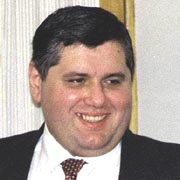
GEORGIAN GOVERNMENT DEBATES DIRECT ELECTION FOR MAYOR OF TBILISI
Publication: Eurasia Daily Monitor Volume: 2 Issue: 121
By:

A political debate about the method of electing the mayor of Tbilisi, as well as talks about the appropriate strategy for the forthcoming by-elections to the Georgian parliament, has led to a rapprochement among several opposition groups.
Currently consultations are underway between the opposition New Rights, Republican, and Conservative parties about possibly nominating common candidates to the by-elections. This tactic likely was determined by the lack of electoral resources. If opposition parties run in the by-elections separately and take votes from each other, they would only play into the hand of the ruling National Movement, which holds a full set of administrative resources in addition to dominating the election committees themselves. For all the potential for a common agenda, there has been no case of successful collaboration between opposition parties during the past decade.
The newly created Central Electoral Commission (CEC) of Georgia (see EDM, June 14) needs to set the date for by-elections in three single-race constituencies in Ajaria, and single-race constituencies in the town of Tkibuli (western Georgia) and the Isani district of Tbilisi. Since April the opposition has unsuccessfully demanded that the authorities schedule the by-elections as soon as possible. On April 15, at a session of the parliamentary committee for legal issues, Davit Berdzenishvili of the Republican Party charged the authorities with deliberately delaying the by-elections in Ajaria and Tkibuli. He said the ruling National Movement fears it will lose in Ajaria, where the Republican Party claims to have stronger positions in the constituencies (Kobuleti, Batumi, and Shuakhevi) where the by-elections are to be held.
The opposition also wants the government to hold direct elections for the mayors of Georgian cities, including Tbilisi, as well as regional governors. Currently, the mayors of Tbilisi and Poti (Georgia’s strategic sea port) are appointed by the president, as are all regional governors. The media has sharply criticized some of the governors for abuse of power. During the 2002 local elections for the first time the population of all Georgian cities except for Tbilisi and Poti elected their mayors. However, after the November 2003 Rose Revolution most of the elected mayors were replaced by National Movement-appointed cadres.
Leaders of the Republican and Conservative parties, as well as the public movement “Forum for Welfare and Democracy,” gathered on June 4 to announce that they would collect signatures from Georgian citizens for a petition to hold a referendum to determine whether voters want direct elections for mayors and regional governors. Although, New Rights and other major opposition parties did not participate in the meeting, they fully support the idea. The provisional coalition of the opposition parties can apply to the CEC with the request to call a referendum after they collect at least 200,000 voter signatures. The opposition says that this appeal will be “the first test for the new CEC.” If the opposition parties manage to collect the required number of signatures, then the CEC should respond to the request to set a referendum within a month, according to the law.
In February the opposition New Rights party faction submitted draft amendments to the Law on the Capital City, which envisaged direct elections for the Tbilisi mayor. The authorities responded with a draft law, according to which elected City Councils (Sakrebulo) will select the mayor from among its members. On February 15, President Mikheil Saakashvili stated that city mayors should be elected starting in 2006. “Directly, or indirectly, but mayors should be elected,” he stressed. The opposition justly argues that the new Sakrebulo of Tbilisi, which is most likely to be dominated by National Movement supporters, would “elect” a mayor favorable to the government. Symptomatically, while in opposition (2001-2003) Saakashvili and his followers from civil society fervently advocated direct elections of city mayors throughout Georgia, appealing to the values of democracy and particularly the European Charter on Self-Governance, which Georgia had joined. However, the same people did an about-face when they moved to the government. The authorities likely want to use this initiative to leave no opportunity for the opposition to succeed.
Following a meeting between President Saakashvili and representatives from the majority faction in parliament, legislator Beso Jugeli reported that the parliamentary majority would vote for Saakashvili’s proposed amendments to the Law on the Capital City. Jugeli said that the President’s ideas are more realistic and acceptable today, for they include a mechanism to recall the mayor. The motion may come to a vote as early as Friday, and, if passed, would empower the Sakrebulo (Tbilisi City Council) to elect the mayor. Meanwhile, the opposition insists on a popular vote.
The next local elections are scheduled for the fall 2006. The ruling party leaders, among others, have made little effort to hide the fact that a popularly elected mayor of Tbilisi could accumulate excessive political and economic powers and might create serious problems for the regime. Approximately one-third of all Georgian voters live in Tbilisi and about 80% of taxes in Georgia are collected in Tbilisi. Analysts contend that the National Movement lacks competitive candidates for a directly elected mayor of Tbilisi, and the Saakashvili-appointed incumbent, Zurab Chiaberashvili, stands little chance of winning.
Meanwhile, Conservative Party leader Koba Davitashvili has announced his intention to run for mayor of Tbilisi. Davit Berdzenishvili of the Republican Party is about to run for the mayor in his hometown of Batumi (Ajaria). It appears that the final decision about the method of electing the mayor of Tbilisi will be a test of democracy not only for the CEC, but also for Saakashvili’s regime as a whole.
(Resonance, Akhali Taoba, June 5; Civil Georgia, Caucasus Press, June 16, June 21; Imedi TV, June 14)




